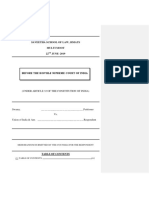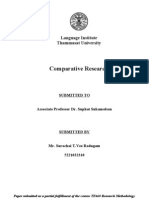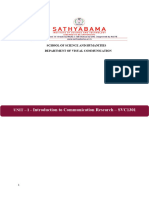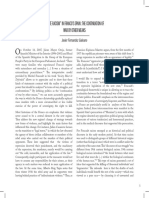Research Methods: Report On Various Types of Researches
Research Methods: Report On Various Types of Researches
Uploaded by
Vaisali Krishna KumarCopyright:
Available Formats
Research Methods: Report On Various Types of Researches
Research Methods: Report On Various Types of Researches
Uploaded by
Vaisali Krishna KumarOriginal Title
Copyright
Available Formats
Share this document
Did you find this document useful?
Is this content inappropriate?
Copyright:
Available Formats
Research Methods: Report On Various Types of Researches
Research Methods: Report On Various Types of Researches
Uploaded by
Vaisali Krishna KumarCopyright:
Available Formats
RESEARCH METHODS
SUBMITTED BY
VAISALI K B070225AR
REPORT ON VARIOUS TYPES OF RESEARCHES
RESEARCH METHODS
Contents
1.WHAT IS RESEARCH? ................................................................................................................. 2 2. APPLIED RESEARCH................................................................................................................... 2 3. BASIC RESEARSH ....................................................................................................................... 2 4. CORRELATIONAL RESEARCH ..................................................................................................... 2 5. DESCRIPTIVE RESEARCH ........................................................................................................... 3 6. ETHNOGRAPHIC RESEARCH ...................................................................................................... 3 7. EXPERIMENTAL RESEARCH ....................................................................................................... 4 8. EXPLORATORY RESEARCH......................................................................................................... 4 9. GRUNDED THEORY RESEARCH ................................................................................................. 5 10. HISTORIC RESEARCH ............................................................................................................... 5 11. PHENOMENOLOGICAL RESEARCH .......................................................................................... 6 12. QUALITATIVE AND QUANTITATIVE REASEARCH..................................................................... 6 12.1 QUALITATIVE RESEARCH .................................................................................................. 6 12.2 QUANTITATIVE RESEARCH ................................................................................................ 7 13.REFERANCE .............................................................................................................................. 8
Vaisali K B070225AR
Page 1
RESEARCH METHODS
1.WHAT IS RESEARCH?
The systematic, rigorous investigation of a situation or problem in order to generate new knowledge or validate existing knowledge.
2. APPLIED RESEARCH
Applied research refers to scientific study and research that seeks to solve practical problems. Applied research is used to find solutions to everyday problems, cure illness, and develop innovative technologies, rather than to acquire knowledge for knowledge's sake. For example, applied researchers may investigate ways to: Improve agricultural crop production Treat or cure a specific disease Improve the energy efficiency of homes, offices, or modes of transportation
3. BASIC RESEARSH
Basic (aka fundamental or pure ) research is driven by a scientist's curiosity or interest in a scientific question. The main motivation is to expand man's knowledge, not to create or invent something. There is no obvious commercial value to the discoveries that result from basic research. For example, basic science investigations probe for answers to questions such as: How did the universe begin? What are protons, neutrons, and electrons composed of? How do slime moles reproduce? What is the specific genetic code of the fruit fly?
4. CORRELATIONAL RESEARCH
Correlational research refers to the systematic investigation or statistical study of relationships among two or more variables, without necessarily determining cause and effect. It seeks to establish a relation/association/correlation between two or more variables that do not readily lend themselves to experimental manipulation. For example, to test the hypothesis Listening to music lowers blood pressure levels there are 2 ways of conducting research Advantages: 1) Can collect much information from many subjects at one time. 2) Can study a wide range of variables and their interrelations. Vaisali K B070225AR Page 2 Experimental group samples and make one group listen to music and then compare the bp levels Survey ask people how they feel ? How often they listen? And then compare
RESEARCH METHODS
3) Study variables that are not easily produced in the laboratory. Disadvantages: 1) Correlation does not indicate causation( cause and effect). 2) Problems with self-report method .
5. DESCRIPTIVE RESEARCH
Descriptive research refers to research that provides an accurate portrayal of characteristics of a particular individual, situation, or group. Descriptive research, also known as statistical research. These studies are a means of discovering new meaning, describing what exists, determining the frequency with which something occurs, and categorizing information. In short descriptive research deals with everything that can be counted and studied, which has an impact of the lives of the people it deals with. For example, finding the most frequent disease that affects the children of a town. The reader of the research will know what to do to prevent that disease thus, more people will live a healthy life. Advantages: 1) The people individual studied are unaware so they act naturally or as they usually do in everyday situation; 2) It is less expensive and time consuming than quantitative experiments; 3) Collects a large amount of notes for detailed studying; 4) As it is used to describe and not make any conclusions it is to start the research with it; Disadvantages 1) 2) 3) 4) Descriptive research requires more skills. Does not identify cause behind a phenomenon Response rate is low in this research. Results of this research can change over the period of time.
6. ETHNOGRAPHIC RESEARCH
Ethnographic research refer to the investigation of a culture through an in-depth study of the members of the culture; it involves the systematic collection, description, and analysis of data for development of theories of cultural behaviour. It studies people, ethnic groups and other ethnic formations, their ethno genesis, composition, resettlement, social welfare characteristics, as well as their material and spiritual culture.
Vaisali K B070225AR
Page 3
RESEARCH METHODS
Data collection is often done through participant observation, interviews, questionnaires, etc. The purpose of ethnographic research is to attempt to understand what is happening naturally in the setting and to interpret the data gathered to see what implications could be formed from the data.
7. EXPERIMENTAL RESEARCH
Experimental research is an objective, systematic, controlled investigation for the purpose of predicting and controlling phenomena and examining probability and causality among selected variables. The simplest experimental design includes two variables and two groups of participants. The two variables(Independent versus Dependent variables). The IV is the predictor variable whereas the DV is the outcome variable. Researchers manipulate and control the IV to study it's effect on the DV.
The two groups of participants (Control versus Experimental group). Before beginning the experiment, the researcher (randomly) assigns his/her sample to two different groups: the control group and the experimental (treatment group or clinical group). The control group receives no manipulation of the IV (no treatment), whereas the experimental group receives the manipulation of the IV
Advantages Best establishes cause-and-effect relationships
Disadvantages Artificiality Feasibility Unethical
8. EXPLORATORY RESEARCH
Exploratory research is a type of research conducted for a problem that has not been clearly defined. Exploratory research helps determine the best research design, data collection method and selection of subjects. The results of exploratory research are not usually useful for decision-making by themselves, but they can provide significant insight into a given situation Exploratory research is not typically generalizable to the population at large. Page 4
Vaisali K B070225AR
RESEARCH METHODS
Exploratory research can be quite informal, relying on secondary research such as reviewing available literature and/or data, or qualitative approaches such as informal discussions with consumers, employees, management or competitors, and more formal approaches through in-depth interviews, focus groups, projective methods, case studies or pilot studies.
9. GRUNDED THEORY RESEARCH
Grounded theory research is a research approach designed to discover what problems exist in a given social environment and how the persons involved handle them; it involves formulation, testing, and reformulation of propositions until a theory is developed. Grounded theory is a research method that operates almost in a reverse fashion from traditional research and at first may appear to be in contradiction to the scientific method. Four stages: 1) 2) 3) 4) Codes-Identifying anchors that allow the key points of the data to be gathered Concepts-Collections of codes of similar content that allows the data to be grouped Categories-Broad groups of similar concepts that are used to generate a theory Theory-A collection of explanations that explain the subject of the research (hypotheses)
10. HISTORIC RESEARCH
Historical research is research involving analysis of events that occurred in the remote or recent past Application Historical research can show patterns that occurred in the past and over time which can help us to see where we came from and what kinds of solutions we have used in the past. Understanding this can add perspective on how we examine current events and educational practices.
The steps involved in the conduct of historical research 1. 2. 3. 4. 5. 6. Identification of the research topic and formulation of the research problem or question. Data collection or literature review Evaluation of materials Data synthesis Report preparation or preparation of the narrative exposition Historical research gives a social scientist a better context for making realistic decisions.
Strengths Provides a comprehensive picture of historical trends Uses existing information Provides evidence of on-going trends and problems Page 5
Vaisali K B070225AR
RESEARCH METHODS
Limitations Time-consuming Resources may be hard to locate Resources may be conflicting May not identify cause of a problem Information may be incomplete, obsolete, inconclusive, or inaccurate Data restricted to what already exists
11. PHENOMENOLOGICAL RESEARCH
Phenomenological research an inductive, descriptive research approach developed from phenomenological philosophy; its aim is to describe an experience as it is actually lived by the person Phenomenology is concerned with the study of experience from the perspective of the individual, bracketing taken-for-granted assumptions and usual ways of perceiving. They are based in a paradigm of personal knowledge and subjectivity, and emphasise the importance of personal perspective and interpretation. As such they are powerful for understanding subjective experience, gaining insights into peoples motivations and actions, and cutting through the clutter of taken-for-granted assumptions and conventional wisdom.
12. QUALITATIVE AND QUANTITATIVE REASEARCH
On a broader perspective, all researches can be classified into two groups: Qualitative Research Quantitative Research
12.1 QUALITATIVE RESEARCH
Qualitative research is research dealing with phenomena that are difficult or impossible to quantify mathematically, such as beliefs, meanings, attributes, and symbols Qualitative researchers aim to gather an in-depth understanding of human behaviour and the reasons that govern such behaviour. The qualitative method investigates the why and how of decision making, not just what, where, when. Advantages 1) It enables more complex aspects of a persons experience to be studied 2) Fewer restriction or assumptions are placed on the data to be collected. 3) Not everything can be quantified, or quantified easily, Individuals can be studied in more depth 4) Good for exploratory research and hypothesis generation Vaisali K B070225AR Page 6
RESEARCH METHODS
5) The participants are able to provide data in their own words and in their own way Disadvantages 1) It is more difficult to determine the validity and reliability of linguistic data 2) there is more subjectivity involved in analysing the data. 3) Data overload open-ended questions can sometimes create lots of data, which can take along time to analyse! 4) Time consuming
12.2 QUANTITATIVE RESEARCH
Quantitative research refers to the systematic empirical investigation of any phenomena via statistical, mathematical or computational techniques. The objective of quantitative research is to develop and employ mathematical models, theories and/or hypotheses pertaining to phenomena Quantitative research is generally made using scientific methods, which can include: The generation of models, theories and hypotheses The development of instruments and methods for measurement Experimental control and manipulation of variables Collection of empirical data Modelling and analysis of data Evaluation of results
Advantages 1) Quantitative research allows the researcher to measure and analyse data. 2) The researcher is more objective about the findings of the research. 3) Quantitative research can be used to test hypotheses in experiments because of its ability to measure data using statistics. Disadvantages 1) The main disadvantage of quantitative research is the context of the study or experiment is ignored. 2) Quantitative research does not study things in a natural setting or discuss the meaning things have for different people. 3) A large sample of the population must be studied for more accurate results
Vaisali K B070225AR
Page 7
RESEARCH METHODS
13.REFERANCE
http://www.ehow.com/info_8091178_advantages-disadvantages-qualitativequantitative-research.html International Journal of Qualitative Methods 3 (1) April, 2004-Groenewald PHENOMENOLOGICAL RESEARCH DESIGN 4 :www.educ.uidaho.edu/kbrowder/pep%2520455/experimental%2520designs.ppt+exper imental+research+design+advantages+and+disadvantages&hl=en&gl=in&pid=bl&srcid= ADGEESgXOrbC554FR6CgOG88icAGv8iuPtkosh6f1JcdRaAVeoP0gjROmnvxfcs3aUK4LaNIMJtOUI7Go6aYo5wn_xM3SKR0IPGWf bfyqPcE6Vk8NdSntDiDXTwGTCCpWeBUIPmrek&sig=AHIEtbTKRqRAua9acOoDcEjArqui6CVe8Q PRACTICAL CONSIDERATIONS IN GROUNDED THEORY METHOD RESEARCH-Nehemiah Mavetera1 & Jan Kroeze2 http://en.wikipedia.org/wiki/Grounded_theory http://en.wikipedia.org/wiki/Ethnography http://www.isfaq.com/education/100211.html wwwPsych.stanford.edu/~bigopp/ramscartalk.ppt+correlational+research+examples&hl =en&gl=in&pid=bl&srcid=ADGEESgDQ4ZYi9Rc7bS-T95d27efNhSCrA5QfR9U http://www.scribd.com/doc/6827685/TYPES-OF-RESEARCH-METHODS http://www.businessdictionary.com/definition/applied-research.html http://medical-dictionary.thefreedictionary.com/phenomenological+research
Vaisali K B070225AR
Page 8
You might also like
- Moot Memorial On AadharDocument30 pagesMoot Memorial On Aadharmadhu50% (8)
- Entrepreneurship ModuleDocument5 pagesEntrepreneurship ModuleHart Franada82% (95)
- 1st Quarter Examination Reviewer in Research 7Document1 page1st Quarter Examination Reviewer in Research 7MARK FERNANDEZNo ratings yet
- Morte D'arthurDocument5 pagesMorte D'arthuremilyjaneboyle100% (3)
- Educ 696 Week 3 Capstone Project Annotated Bibliography Donathanushi HettipathiranaDocument11 pagesEduc 696 Week 3 Capstone Project Annotated Bibliography Donathanushi Hettipathiranaapi-350805379No ratings yet
- Lesson 3 - Hominization and HumanizationDocument40 pagesLesson 3 - Hominization and HumanizationJoanna Ruth SeproNo ratings yet
- Literature Review - Diversity and WorkDocument19 pagesLiterature Review - Diversity and WorkFunyIstrateNo ratings yet
- Chapter 2 Reseaarch TypesDocument41 pagesChapter 2 Reseaarch TypesadNo ratings yet
- AMR NotesDocument35 pagesAMR NotesSanah BandiwdekarNo ratings yet
- Overview of Research and Its Methodologies PROF NWAORGUDocument9 pagesOverview of Research and Its Methodologies PROF NWAORGUEducation Tech CentreNo ratings yet
- Unit-2 Types of Research (E-Next - In)Document10 pagesUnit-2 Types of Research (E-Next - In)mbaonline4No ratings yet
- KMBN 203 Unit-2Document5 pagesKMBN 203 Unit-2Ramesh ChandraNo ratings yet
- Major Type of Social ResearchDocument32 pagesMajor Type of Social Researchashish.kumar.freelancerNo ratings yet
- Research PA 201 1st Tri 22Document59 pagesResearch PA 201 1st Tri 22mary claire candidoNo ratings yet
- Research Methods 400LDocument77 pagesResearch Methods 400Lsadiq rabiu umarNo ratings yet
- Research MethodologyDocument67 pagesResearch Methodologympharmpharmacology07No ratings yet
- Define ResearchDocument6 pagesDefine Researchpagalaran.johnlouisNo ratings yet
- Handout 2Document3 pagesHandout 2mahather silunganNo ratings yet
- Basic Concepts IN Research: Mark Christian Roble Almazan, LPTDocument26 pagesBasic Concepts IN Research: Mark Christian Roble Almazan, LPTMark Christian AlmazamNo ratings yet
- အအအအအအအအအအအအအအအ အအအအအအအ အအအအအအအ Chem - 4105 (Research Methodology)Document15 pagesအအအအအအအအအအအအအအအ အအအအအအအ အအအအအအအ Chem - 4105 (Research Methodology)YU TANo ratings yet
- Nursing Research & StatisticsDocument15 pagesNursing Research & StatisticsAnonymous hYMWbA100% (1)
- Qualitative & Quantitative ResearchDocument42 pagesQualitative & Quantitative ResearchAllenaNo ratings yet
- Comparative Research TDocument8 pagesComparative Research TpratoomsriNo ratings yet
- Research Methods Lecture 1Document36 pagesResearch Methods Lecture 1Folarin EmmanuelNo ratings yet
- RM Unit 1Document9 pagesRM Unit 1anubhaviawasthi20No ratings yet
- Chapert One Resarc 2022Document11 pagesChapert One Resarc 2022Dagi Man100% (1)
- Practical Research 2 Module 4: Designs A Research Used in Daily LifeDocument7 pagesPractical Research 2 Module 4: Designs A Research Used in Daily Life306947 Bancal Pugad ISNo ratings yet
- SBT1002Document198 pagesSBT1002Kannan ThangaveluNo ratings yet
- BILLONO BSCE3 ResearchMethods Output1Document5 pagesBILLONO BSCE3 ResearchMethods Output1Christian Paul GaNo ratings yet
- MMR Answers CompiledDocument26 pagesMMR Answers CompiledRaghav GargNo ratings yet
- Revised Research Methodologies ManualDocument100 pagesRevised Research Methodologies Manualdamion100% (1)
- PRACTICAL RESEARCH 3RD QUARTER ReviewerDocument13 pagesPRACTICAL RESEARCH 3RD QUARTER Reviewerayatooo.xxxNo ratings yet
- Chapter Three Research Desings 1Document20 pagesChapter Three Research Desings 1Mimo HemadNo ratings yet
- Practical ResearchDocument58 pagesPractical Researcharianne maeNo ratings yet
- Module 5 Methods of ResearchDocument4 pagesModule 5 Methods of ResearchGrace Anne Marie MarasiganNo ratings yet
- Research Methods in PsychologyDocument23 pagesResearch Methods in PsychologyHamxa AmeerNo ratings yet
- Scales and VariablesDocument28 pagesScales and Variablesmelika.gharaatimanesh1381No ratings yet
- QUANTITATIVE and Qualitative Research DesignDocument29 pagesQUANTITATIVE and Qualitative Research DesignSitie 星 HikariNo ratings yet
- RESEARCH Complete NOTESDocument37 pagesRESEARCH Complete NOTESEmmanuel ThadeusNo ratings yet
- C1 - Psychology A Scientific Discipline NotesDocument4 pagesC1 - Psychology A Scientific Discipline NotesBhakti NaikNo ratings yet
- Business Research Method All in OneDocument71 pagesBusiness Research Method All in Onebibeek.1029No ratings yet
- Hypothesis Formulation Helps in Formulating The Research Problem. Hypothesis Formulation Is Not A Necessary But An Important Step of The ResearchDocument38 pagesHypothesis Formulation Helps in Formulating The Research Problem. Hypothesis Formulation Is Not A Necessary But An Important Step of The ResearchPuspendra jephNo ratings yet
- PR2 Lesson 1Document5 pagesPR2 Lesson 1Marcco Juan MarccoNo ratings yet
- Unit 3 Ethical Guidelines and Considerations in ResearchDocument13 pagesUnit 3 Ethical Guidelines and Considerations in ResearchRalph TomarongNo ratings yet
- LAS PR 2 1stQDocument5 pagesLAS PR 2 1stQYoo Ae ChaNo ratings yet
- Discussion Guide No. 1Document5 pagesDiscussion Guide No. 1Zara RejusoNo ratings yet
- Class 11 Psychology Chapter 2Document42 pagesClass 11 Psychology Chapter 210080100% (1)
- Definition of ResearchDocument59 pagesDefinition of ResearchRidho FitraNo ratings yet
- ExperimentalDocument10 pagesExperimentalRobert UmandalNo ratings yet
- GA BSCE3 ResearchMethods Output1-2Document5 pagesGA BSCE3 ResearchMethods Output1-2Christian Paul GaNo ratings yet
- Nature of Inquiry and ResearchDocument5 pagesNature of Inquiry and ResearchLoren c Agyapas50% (2)
- PR2 Mod1 and 2Document67 pagesPR2 Mod1 and 2Jaime SorianoNo ratings yet
- Unit One To FiveDocument51 pagesUnit One To FivelmotshwarediNo ratings yet
- Reviewer LectureDocument2 pagesReviewer LecturejnlynxxpnepomucenoNo ratings yet
- Chapter1 1Document45 pagesChapter1 1rahelNo ratings yet
- Research3 PDFDocument4 pagesResearch3 PDFFrances Imee PatagNo ratings yet
- Chap. IIDocument35 pagesChap. IIZahra NasreenNo ratings yet
- Descriptive Research - Tampocao&cerilo R.Document66 pagesDescriptive Research - Tampocao&cerilo R.Jelyn MamansagNo ratings yet
- Etika Dan Desain Penelitian - KuliahDocument38 pagesEtika Dan Desain Penelitian - KuliahAndy Warnock VoltzGazetteNo ratings yet
- Unit 1Document7 pagesUnit 1Taveri RajkhowaNo ratings yet
- Quantative Research Methods NotesDocument50 pagesQuantative Research Methods NotesNjeri MbuguaNo ratings yet
- Nature and Inquiry of ResearchDocument35 pagesNature and Inquiry of ResearchHenson CastilloNo ratings yet
- SVC1301Document46 pagesSVC1301Tarana SinghNo ratings yet
- Manual 2ResearchMethodsDocument19 pagesManual 2ResearchMethodsL YNo ratings yet
- ResearchDocument33 pagesResearchBeselamu BelilaNo ratings yet
- The Neverhood ChroniclesDocument57 pagesThe Neverhood ChroniclesCarolina Silva RodéNo ratings yet
- Back Alley Dice GamesDocument4 pagesBack Alley Dice GamesbuggerboyzNo ratings yet
- Real Friends: Camila Cabello Ft. Swae LeeDocument5 pagesReal Friends: Camila Cabello Ft. Swae LeeRahmawati KharismaNo ratings yet
- Kissa Kursi Ka - Part 1: The Game of Thrones Quiz - Questions and AnswersDocument9 pagesKissa Kursi Ka - Part 1: The Game of Thrones Quiz - Questions and AnswersLalitNo ratings yet
- RizalDocument7 pagesRizalANA FRANCESCA R. CAGURANGANNo ratings yet
- 2022 Ssce External TimetableDocument1 page2022 Ssce External TimetableGwadue SundayNo ratings yet
- Uts FinalsDocument7 pagesUts FinalsAlexys Anne CrisostomoNo ratings yet
- State Racism in Franco's Spain.Document5 pagesState Racism in Franco's Spain.Mr SanchezNo ratings yet
- Mechanical Users GuideDocument482 pagesMechanical Users Guidedatlaravivarma1177No ratings yet
- Year 2 English Portfolio SatisfactoryDocument0 pagesYear 2 English Portfolio SatisfactoryernsteinsNo ratings yet
- bUSINESS Plan and Development NotesDocument48 pagesbUSINESS Plan and Development NotesHãrdyNo ratings yet
- CESC Q4 Lesson 3 PDFDocument37 pagesCESC Q4 Lesson 3 PDFCherryl MarigocioNo ratings yet
- Statistical Issues in Bioavailability Bioequivalence Studies Jbb.S1 007Document8 pagesStatistical Issues in Bioavailability Bioequivalence Studies Jbb.S1 007Yi XinNo ratings yet
- Vocab RapDocument1 pageVocab RapMrFeatherNo ratings yet
- Pre-Test: Multiple Choice: Choose The Letter of The Correct Answer. Write Your Answer On ADocument20 pagesPre-Test: Multiple Choice: Choose The Letter of The Correct Answer. Write Your Answer On AI am julia VillagonzaloNo ratings yet
- Cryopette Demonstration: Humagen Pipets Medicult Media Midatlantic DevicesDocument21 pagesCryopette Demonstration: Humagen Pipets Medicult Media Midatlantic DevicesDilip Pandurang PattilNo ratings yet
- DAT Manual PDFDocument60 pagesDAT Manual PDFPranav LakdeNo ratings yet
- Ako - Cnc65 Tube Bending MachineDocument30 pagesAko - Cnc65 Tube Bending MachineNguyen Quyet Thang100% (1)
- RF Series: Low Pressure FiltersDocument10 pagesRF Series: Low Pressure FiltersRestu OktapianaNo ratings yet
- The Impact of Humor in Advertising: A Review: Marc G. Weinberger and Charles S. GulasDocument26 pagesThe Impact of Humor in Advertising: A Review: Marc G. Weinberger and Charles S. GulasSujal RaneNo ratings yet
- 1 Discuss Briefly About Fair Value Measurement and ImpairmentDocument13 pages1 Discuss Briefly About Fair Value Measurement and ImpairmentBosena TadegeNo ratings yet
- Living With A SulphurDocument4 pagesLiving With A SulphurcelliasttNo ratings yet
- Klasifikasi JamurDocument17 pagesKlasifikasi JamurKhusnul KhatimahNo ratings yet
- Sebaca National High SchoolDocument3 pagesSebaca National High SchoolJulius Azcuna100% (1)

























































































